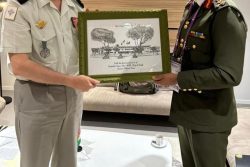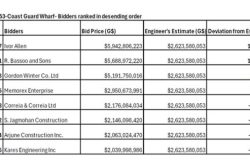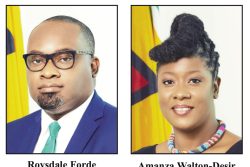Dear Editor,
Wild men trained with professional credentials (land survey certificates, ACCAs and law degrees) are filling in as social scientists. They are perceived by the common man or woman as educated and erudite, which they are. I guess this is because several holders of graduate degrees in economics have stayed quiet on the troublesome topic of ethnic income and wealth inequality or they are hoping to cash in on the One Guyana thing, or perhaps a consulting gig from the IDB? They cannot rock the boat. They might be scared of losing career momentum if they say something that offends the little Jagdeoian napoleons buried like mines all over the private sector.
The historical results when the social scientists, primarily quantitatively trained economists, failed to provide a public good of critical thinking have been episodes like Jan 12, 1998, kick down the door of the 1980s, Mon Repos riots against poor East Indian vendors, taxation on farmers with small plots (the policy was based on the false narratives of the wild men and Mr. Moses Nagamootoo’s take that a 20-acre plot generates large incomes), the Buxton uprising, rigged elections for the purpose of controlling the economic pie, attempts at election rigging with the objective of owning the pie, among others.
Editor, I want to use this letter to support Mr. Robin Singh’s (SN, Dec 9, 2022) call for an inquiry into the awarding of contracts in order to address the alleged discrimination against African Guyanese. However, I feel an independent panel can look at contracts awarded from 2015 to present. We cannot just look at the dollar amounts awarded to one ethnic group as evidence of systematic discrimination. We have to look, at minimum, at the following: (i) the application rates of people of various ethnic groups; (ii) the rejection rates of people of various ethnic groups; (iii) the acceptance rates of people of various ethnic groups; and (iv) repeat the previous three inquiries by dollar amount and ethnicity, as well as experience. How, for example, the dollar amounts match experience and ethnicity?
I also want to use this letter to call for another inquiry – as long as the one indicated above is over – into the ethnic composition of contract employment in the civil service from 2010 to present. The latter is very important since the minimum pay in the civil service is much higher nowadays than that of the private sector. Moreover, contract workers are paid much higher than the minimum pay in the public service.
Before I go, please permit me to comment on a letter (same date as above) lamenting the occurrence of new flooding in Patentia, which the anonymous writer tied to the closure of the Wales sugar estate. Such new flooding should be no surprise. The solution to flooding in the Guyanese polder system is a collective action problem, not a task for private or individual solution. Coffee, cotton, cacao and sugar plantations that tried to address this problem privately failed from the 1700s to when the sugar industry was amalgamated under large-scale production by the early 1900s. Bookers understood the collective action problem and produced it for Guyanese, but the young wild men and women of the independence era wanted them out and clamoured for nationalization.
After Bookers, the government-owned GuySuCo provided the free public good of drainage to the coastal society. Leaders from the PNC, GAWU and PPP never quite understood this, always thinking that GuySuCo only produced a single private good: sugar. It will only get worse. I hope the billion USD gas-to-shore power plant will not get flooded.
Yours faithfully,
Tarron Khemraj






